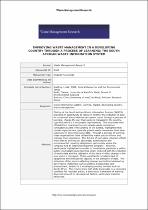 ResearchSpace
ResearchSpace
Improving waste management through a process of learning: the South African waste information system
JavaScript is disabled for your browser. Some features of this site may not work without it.
- ResearchSpace
- →
- Research Publications/Outputs
- →
- Conference Publications
- →
- View Item
| dc.contributor.author |
Godfrey, Linda K

|
|
| dc.contributor.author |
Scott, D

|
|
| dc.date.accessioned | 2011-07-07T13:36:28Z | |
| dc.date.available | 2011-07-07T13:36:28Z | |
| dc.date.issued | 2011-05 | |
| dc.identifier.citation | Godfrey, L.K., and Scott, D. 2011. Improving waste management through a process of learning: the South African waste information system. Waste Management & Research, Vol. 29(5), pp 501-511 | en_US |
| dc.identifier.issn | 0734-242X | |
| dc.identifier.uri | http://wmr.sagepub.com/content/early/2010/09/18/0734242X10382591.full.pdf | |
| dc.identifier.uri | http://hdl.handle.net/10204/5086 | |
| dc.description | Copyright: 2011 SAGE Publications. This is a pre print version of the work. The definitive version is published in Waste Management & Research, Vol. 29(5), pp 501-511 | en_US |
| dc.description.abstract | Piloting of the South African Waste Information System (SAWIS) provided an opportunity to research whether the collection of data for a national waste information system could, through a process of learning, change the way that waste is managed in the country, such that there is a noticeable improvement. The interviews with officials from municipalities and private waste companies, conducted as part of the piloting of the SAWIS, highlighted that certain organisations, typically private waste companies have been successful in collecting waste data. Through a process of learning, these organisations have utilised this waste data to inform and manage their operations. The drivers of such data collection efforts were seen to be financial (business) sustainability and environmental reporting obligations, particularly where the company had an international parent company. However, participants highlighted a number of constraints, particularly within public (municipal) waste facilities which hindered both the collection of waste data and the utilisation of this data to effect change in the way waste is managed. These constraints included a lack of equipment and institutional capacity in the collection of data. The utilisation of this data in effecting change was further hindered by governance challenges such as politics, bureaucracy and procurement, evident in a developing country context such as South Africa. The results show that while knowledge is a necessary condition for resultant action, a theoretical framework of learning does not account for all observed factors, particularly external influences. | en_US |
| dc.language.iso | en | en_US |
| dc.publisher | SAGE Publications | en_US |
| dc.relation.ispartofseries | Workflow;3539 | |
| dc.subject | Waste information system | en_US |
| dc.subject | Developing country | en_US |
| dc.subject | Waste management | en_US |
| dc.subject | Learning | en_US |
| dc.subject | Impact | en_US |
| dc.title | Improving waste management through a process of learning: the South African waste information system | en_US |
| dc.type | Conference Presentation | en_US |
| dc.identifier.apacitation | Godfrey, L. K., & Scott, D. (2011). Improving waste management through a process of learning: the South African waste information system. SAGE Publications. http://hdl.handle.net/10204/5086 | en_ZA |
| dc.identifier.chicagocitation | Godfrey, Linda K, and D Scott. "Improving waste management through a process of learning: the South African waste information system." (2011): http://hdl.handle.net/10204/5086 | en_ZA |
| dc.identifier.vancouvercitation | Godfrey LK, Scott D, Improving waste management through a process of learning: the South African waste information system; SAGE Publications; 2011. http://hdl.handle.net/10204/5086 . | en_ZA |
| dc.identifier.ris | TY - Conference Presentation AU - Godfrey, Linda K AU - Scott, D AB - Piloting of the South African Waste Information System (SAWIS) provided an opportunity to research whether the collection of data for a national waste information system could, through a process of learning, change the way that waste is managed in the country, such that there is a noticeable improvement. The interviews with officials from municipalities and private waste companies, conducted as part of the piloting of the SAWIS, highlighted that certain organisations, typically private waste companies have been successful in collecting waste data. Through a process of learning, these organisations have utilised this waste data to inform and manage their operations. The drivers of such data collection efforts were seen to be financial (business) sustainability and environmental reporting obligations, particularly where the company had an international parent company. However, participants highlighted a number of constraints, particularly within public (municipal) waste facilities which hindered both the collection of waste data and the utilisation of this data to effect change in the way waste is managed. These constraints included a lack of equipment and institutional capacity in the collection of data. The utilisation of this data in effecting change was further hindered by governance challenges such as politics, bureaucracy and procurement, evident in a developing country context such as South Africa. The results show that while knowledge is a necessary condition for resultant action, a theoretical framework of learning does not account for all observed factors, particularly external influences. DA - 2011-05 DB - ResearchSpace DP - CSIR KW - Waste information system KW - Developing country KW - Waste management KW - Learning KW - Impact LK - https://researchspace.csir.co.za PY - 2011 SM - 0734-242X T1 - Improving waste management through a process of learning: the South African waste information system TI - Improving waste management through a process of learning: the South African waste information system UR - http://hdl.handle.net/10204/5086 ER - | en_ZA |





